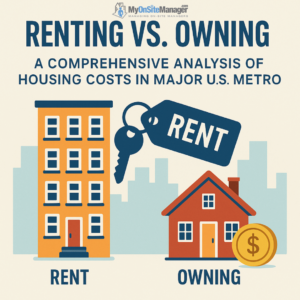For many Americans, the decision between renting and owning a home is one of the most significant financial choices they will make. While homeownership has long been seen as a hallmark of financial stability and success, a recent analysis from LendingTree, based on U.S. Census Bureau data, reveals a striking trend: renting is more affordable than owning a home in every major metropolitan area in the U.S.
This revelation challenges conventional wisdom and has profound implications for potential homebuyers, renters, and real estate investors alike. Let’s take a deeper look at the key findings of the report and what they mean for individuals navigating today’s housing market.
The Key Findings: Renting Costs Less Than Owning Nationwide
According to the LendingTree study, across the 100 largest U.S. metropolitan areas, renters pay less in monthly housing costs than homeowners with mortgages. This trend is consistent nationwide, emphasizing the financial advantage of renting over buying in the current market.
The primary factors contributing to this cost difference include:
- High home prices: The housing market remains competitive, and home prices continue to rise in many cities, making ownership more expensive.
- Mortgage interest rates: With mortgage rates fluctuating, monthly mortgage payments can be significantly higher than rental costs.
- Property taxes and homeowners insurance: These additional expenses make homeownership more costly than just the mortgage itself.
- Maintenance and repairs: Homeowners bear the financial responsibility of upkeep, repairs, and home improvements, which renters are not responsible for.
This data highlights a growing reality: while homeownership has its long-term benefits, renting remains a more financially viable option for many Americans in the short to medium term.
Breaking Down the Cost Differences
To better understand this disparity, let’s consider a few examples from major metropolitan areas:
- In cities like New York, Los Angeles, and San Francisco, where property values are exceptionally high, the gap between renting and owning is particularly stark. Homeowners in these areas often pay thousands of dollars more per month compared to renters.
- In mid-sized cities like Denver, Austin, and Nashville, the trend remains the same, though the gap is slightly smaller.
- Even in more affordable regions like Cincinnati, St. Louis, and Kansas City, renters still pay less than homeowners, proving that this isn’t just a coastal or big-city phenomenon—it’s a nationwide reality.
The study found that, on average, renters pay hundreds—sometimes even thousands—of dollars less per month than homeowners.
Why Renting Is the More Affordable Option Right Now
Given the financial implications, many people are opting to rent instead of buy. Here are some of the key advantages of renting in the current market:
1. Lower Monthly Costs
The most obvious benefit is the immediate financial relief that renting provides. Without having to pay for a mortgage, property taxes, and maintenance, renters enjoy a more predictable and lower monthly expense.
2. No Long-Term Financial Commitment
Buying a home requires a substantial upfront investment, including a down payment, closing costs, and other fees. Renting, on the other hand, typically requires only a security deposit and first month’s rent, making it a more accessible option for those without significant savings.
3. Flexibility and Mobility
One of the biggest advantages of renting is the ability to relocate easily. Unlike homeowners, who must go through the lengthy process of selling a property, renters can move freely as job opportunities, lifestyle changes, or market conditions shift. This flexibility is particularly appealing to younger professionals, remote workers, and individuals who anticipate moving within the next few years.
4. No Maintenance or Repair Costs
Homeownership comes with the responsibility of maintaining the property. From plumbing issues to roof repairs, these costs can quickly add up. Renters, however, do not bear these costs, as they are typically the landlord’s responsibility. This saves tenants from the unexpected financial burdens that homeowners frequently encounter.
5. Protection from Market Fluctuations
The housing market is unpredictable. Home values can decrease, leaving homeowners with negative equity (owing more than their home is worth). Renters are insulated from these risks and do not have to worry about declining property values affecting their financial future.
Does This Mean Homeownership Is a Bad Idea?
Not necessarily. Owning a home still has long-term benefits, including:
- Building equity: When you make mortgage payments, you are investing in an asset that may appreciate over time.
- Tax benefits: Homeowners may qualify for tax deductions on mortgage interest and property taxes.
- Stability and personalization: Unlike renting, homeownership allows you to customize and renovate your space freely.
- Potential rental income: Homeowners can generate passive income by renting out part or all of their property.
However, given the current economic climate and housing costs, it may not be the right time for everyone to buy. Potential homeowners should carefully evaluate their financial situation, job stability, long-term goals, and market conditions before making a decision.
The Bottom Line: Renting vs. Owning in Today’s Market
Renting is currently the more affordable housing option in all major U.S. metropolitan areas, according to the LendingTree report. This trend is driven by high home prices, mortgage rates, and additional costs associated with ownership.
That said, the decision between renting and buying is not just about affordability—it’s about individual financial goals, lifestyle, and long-term planning. For those looking for lower monthly costs, flexibility, and fewer responsibilities, renting may be the better choice for now. For those ready to make a long-term investment, willing to take on homeownership responsibilities, and financially prepared, buying a home may still be a worthwhile endeavor.
Regardless of the choice, it’s essential to do thorough research, weigh the pros and cons, and consider both short-term financial stability and long-term wealth-building opportunities.

